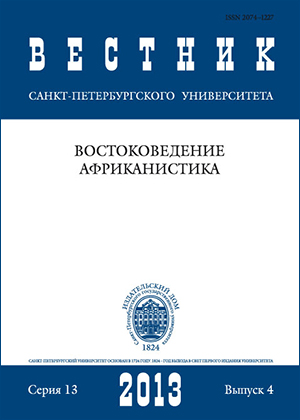Mythological motives and postmodern irony in the novel “Fontanelle” by Meir Shalev
Abstract
The article deals with the novel “Fontanelle” by the famous Israeli writer Meir Shalev. The novel was published in 2002 and has been translated into several languages. Together with other works by the author it is considered to fall into a category of postmodernism — a trend that has influenced in the recent decades not only the Israeli fiction, but also other literatures of the Middle East region. Another common feature of Meir Shalev’s works is his keen interest in mythological images and themes of ancient times (especially, that of the Bible) and in patterns of mythological nature found in the collective conscience of modern Israeli people. These two main patterns that include attitudes toward Holy Scriptures and representations of Founding Fathers of the state of Israel have turned into national metanarratives. The researcher of this article focuses on how the writer uses various mythological motives to create subjects and plots imbued with elements of postmodernistic irony. The author of the research has also made an attempt to trace postmodern response reflected in the novel to the forementioned metanarratives and to give examples of how fictional parody affects heroes from the Old Testament and images from modern Israeli myths. Refs 10.
Keywords:
literature, Israel, fiction, prose, Hebrew, literary studies, postmodernism
Downloads
References
Downloads
Published
How to Cite
Issue
Section
License
Articles of "Vestnik of Saint Petersburg University. Asian and African Studies" are open access distributed under the terms of the License Agreement with Saint Petersburg State University, which permits to the authors unrestricted distribution and self-archiving free of charge.





